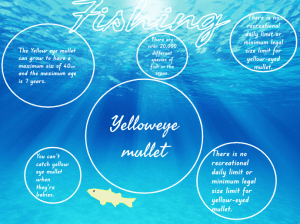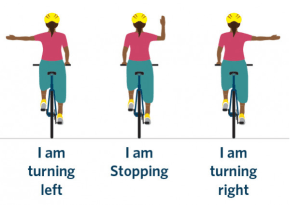Today we each made a poster about fish. My poster was about the yellow eye mullet fish.

Today we each made a poster about fish. My poster was about the yellow eye mullet fish.

—————————————————————————————————————————————–
Quota fishing is when you have a limit of how much fish you can catch at the time.
If you want to fish recreationally in New Zealand, you’re legally required to follow the fishing rules. These change often and are different around the country. Check your local rules each time before you go fishing.
For most fish you have a limit of how much fish you can catch daily but every fish has a different limit.
Here are some links to photos of fish.

Over the last couple of weeks we have been learning about metaphors and similes. Then our teacher gave us an image of a fox and told us to write a story about the image, Including similes and metaphors. I have really enjoyed writing this story and including the similes and metaphors.
Over the past few weeks we have been learning about lending and debt. Today we went over what we did last week and we also learnt some meanings of things.
Here are some meanings:

I am working towards getting my Esmart digital licence.So far I have done 2/4 modules. All of the modules have a different theme.
In module one I have learnt about how to balance my time on devices and how to balance my time doing other things like schoolwork, Family time and many other things. I have also learnt that if you are someone that spends all of your time on your device then it’s a really good idea to set a timer for yourself because if you spend all day and all night on your device then you could get sore eyes,bad posture and many other things.In the second module I haven’t done a lot but it’s all about kindness.
Today people from brain busters came to our school. They were here to talk to the year 8 about brain busters. If they wanted to do it there was a link to a site for them to sign up on. There are all different things that they can enter into. If you are good at maths you can enter into that or if you are good at Te reo Maori then you can enter into that.
Explore the Christchurch City Councils Top Tips for Cycling page.
What information is on their page?
Can you find information about bike maintenance?
What are the ABCs of bike maintenance?
How many kilometers of cycleways are there in Christchurch?
What is a hook turn?
What is a greenway?
What is something you found interesting while exploring the Christchurch City Councils pages?
Question 1
There is information about biking rules.
Question 2
A bike that fits you well and is in good shape makes all the difference
Question 3
A: for Air
B: is for bracks
C: check the air perisher
C: is for Cranks, Chain, and Cogs
C: Check to make sure coaster brakes will stop the bike.
Question 4
There are more than 60 km of cycle ways.
Question 5
Hook turns mean that you can stay on the left side of the road at all times –
you don’t need to move across traffic to turn right.
Question 6
a strip of undeveloped land near an urban area, set aside for recreational use or environmental protection.
Question 7
Something that I found interesting was that there is links within links about different things.
What road rules must you use when riding your bike? (7)
Riding responsibly includes:
• obeying give way rules, road signs and markings
• using hand signals
• passing other people safely and without startling them • keeping left when it is safe • riding so that no more than two riders stay side-by-side • not riding distracted or impaired • not riding on footpaths (exceptions apply).
What does riding defensively mean?
It is your responsibility to be aware of hazards. Scan for hazards and be ready to deal with them. Hazards can come from the road and environment around you, and from the people you share the road with.
What signals should a cyclist know and when should they use them?
There are three official hand signals.
Extend your left arm and hand to signal that you are going to turn or move left.
Extend your right arm and hand to signal that you are going to turn or move right.
Extend your right arm and raise your forearm and hand to signal that you are going to stop.
You must use the correct hand signal for at least 3 seconds before:
moving into traffic
stopping
turning left or right
moving left or right (such as starting off, changing lanes or taking the lane)

This is my timetables chart that I right in my score and time so I can see if I’m getting better or if I need to work on my timetables.
